5 Best Linux Web Hosting Providers for 2024
Our independent research projects and impartial reviews are funded in part by affiliate commissions, at no extra cost to our readers. Learn more
Being unable to find reliable, high-performance Linux hosting can leave your site sluggish and unreachable. And that’s far from ideal. Your Linux-based site deserves a website hosting provider that fully optimizes and smoothly runs open-source software, along with top-notch security, responsive support, and helpful resources for open-source users.
But with a fair few options out there, identifying the ideal Linux host can prove challenging. Don’t fear, though, as we’ve whittled it down to five top hosts, and interviewed Linux expert Jonathan Popoola for his insights and tips.
And if you want the TLDR, then Bluehost comes out number one as the overall best provider. Keep reading to see which other hosts made the cut and why these are our five favorites.
5 Best Linux Web Hosting Providers
- Bluehost – Best overall provider
- HostGator – Best for technical help and customer support
- A2 Hosting – Best for speed
- SiteGround – Best for security
- Hostinger – Best for price
1. Bluehost
Best all-around Linux hosting provider
Bluehost is our top pick for the best Linux hosting provider. With fast page loads and competitive pricing starting at just $1.99 per month, Bluehost takes the top honor for its great performance, beginner support, and value in running WordPress sites and custom Linux deployments.
Pros and Cons
✔️ What We Liked
- Competitive starting price of just $1.99 per month
- WordPress integration and support
- Top-class customer support
❌ What We Didn’t Like
- No monthly shared hosting plans—users need to commit to a minimum of 12 months
- Additional features quickly push the price up
Who Is Bluehost For?
| Recommended for… | Not recommended for… |
|---|---|
| WordPress users | Users looking for more moderate renewal fees |
| Beginners | |
Overall WordPress star rating: 4.8/5
More Information
- Check out our Bluehost pricing review for the full lowdown.
Ease of Use
Bluehost earns top marks for user-friendliness thanks to its intuitive cPanel interface, making it easy for anyone to navigate their way around. Beyond that, a one-click installer for apps like WordPress means you automate installation processes.
Its user-friendly interface also makes managing things like domains, emails and databases a painless process.
Plans and Pricing
| Hosting type | Promotional Price Range (12 months unless specified) | Renewal Price Range |
|---|---|---|
| Shared | $1.99–$6.99/month | $3.99-$15.99/month |
| Managed WordPress | $1.99–$6.99/month | $3.99-$15.99/month |
| Cloud | $29.99-$109.99/month | $79.99–$249.99/month |
| VPS | $31.99–$71.99/month (36-month term) | $81.99–$144.99/month |
| Dedicated | $91.98–$141.99/month (36-month term) | $181.99–$261.99/month |
The good news is that all plans feature Linux hosting, thanks to Bluehost being a Linux-based hosting provider. That means you can get up and running for as little as $1.99 per month on the Basic plan, which comes with 10GB of storage, as well as free SSL and chat support.
It’s worth noting, however, that the low fees offered are for a commitment to either 12 or 36 months, and there’s no month-by-month payments on the shared website hosting plans.
Saying that, you do get a 30-day money-back guarantee should you decide the service isn’t for you.
Linux Compatibility
Bluehost isn’t short of Linux support and offers full compatibility with the most popular open-source technologies. Its servers run CentOS Linux with Apache 2.4 and support installing additional packages through cPanel or SSH. In layman’s terms, that means you have the flexibility to customize your hosting environment.
You also get root access plus the latest versions of scripting languages like PHP 8.1, Python 3.8 and Perl 5 pre-installed. Web apps can leverage frameworks ranging from current Node.js to Python Django and Ruby on Rails.
Bluehost keeps CentOS updated and optimized for web hosting needs. In other words, it handles all the maintenance and configuration behind the scenes to ensure the version of CentOS included works great for running websites and web applications out-of-the-box.
With everything from loadable modules to one-click CMS installs accounted for, Linux users have all the customization and optimization capabilities required from the get-go.
Performance Optimization
Bluehost hits the right spots with its Linux hosting by offering optimized CentOS servers that support caching solutions like Redis and allow root access for server customization. This is helpful because it provides a fast and flexible hosting environment ready to power high-performance websites out of the box, while still giving you full control to customize your setup further through things like SSH.
Its performance optimizations, combined with easy management of server parameters and server-side tools, make it a smart choice if you’re after a high-performance, customizable Linux hosting solution.
Performance Optimization Tip from a Linux Expert:
If I had to recommend one optimization to improve Linux performance, it would be to properly configure your storage and filesystem. … Proper storage configuration can significantly boost system responsiveness and performance.
— Jonathan Popoola
Best All-Around Linux Web Hosting Provider
With its optimized Linux servers, breadth of open source support, high-performance capabilities out-of-the-box, and extremely affordable pricing, Bluehost takes our top honor as the leading Linux web host for new site owners and developers alike.
2. HostGator
Best for technical and customer support
HostGator looks good as a Linux host and takes second place thanks to rock-solid uptime with guarantees, unmetered bandwidth across all plans, and excellent support options for troubleshooting issues quickly.
Pros and Cons
✔️ What We Liked
- Unmetered bandwidth across all shared web hosting plans
- Excellent range of customer support options, including tech tickets
- User-friendly interface
❌ What We Didn’t Like
- The website builder has been discontinued for new users
- High renewal fees mean the price can jump by as much as 70-plus percent on some plans
Who Is HostGator For?
| Recommended for… | Not recommended for… |
|---|---|
| Small businesses and individuals looking for Linux options | Those who prefer a hosting plan with a free website builder included |
| Users who enjoy a smooth, easy-to-navigate interface | |
WordPress star rating: 4.7/5
More Information
- See our full HostGator review.
Ease of Use
HostGator makes Linux hosting extremely straightforward courtesy of its intuitive cPanel control, which streamlines web server management for users of all technical levels. Guiding you along is HostGator’s Gator Support team, who are available 24/7 to help via chat, phone, and knowledge base.
It also facilitates quick deployments of CMSs like WordPress using one-click installers. Between the simplified cPanel functionality and readily available assistance, even Linux administration novices will feel comfortable managing things like domains, emails, databases, and more.
Plans and Pricing
| Hosting type | Promotional price range (36-month term) | Renewal price range |
|---|---|---|
| Shared | $2.52–$4.67/month | $5.49–$8.27/month |
| Managed WordPress | $3.05–$9.95/month | $12.95–$16.22/month |
| VPS | $36.99–$95.99/month | $65.47–$130.55/month |
| Dedicated | $91.98–$141.99/month | $125.09–$214.40/month |
Like Bluehost, all of HostGator’s plans include support for Linux. If you’re looking for a cheap entry-level option, the Baby shared web hosting plan is your best bet. With it, you get 10GB storage and unmetered bandwidth, along with an email address.
Just remember that while the introductory pricing looks appealing, HostGator prices jump significantly upon renewal—in many cases, it’s more than a 70% hike. Still, you can try before you buy with a generous 45-day money-back guarantee.
More Information
- Find out more about costs with our HostGator pricing rundown.
Linux Compatibility
A Linux-optimized environment sits at the core of HostGator’s hosting services. It fully supports installing open source software packages, applications, and programming languages website owners commonly need.
For starters, you can pick between having the latest CentOS, Debian, Fedora or Ubuntu Linux versions powering your sites during signup. Plus, popular languages like PHP, Python, and Perl are all enabled on HostGator in their newest versions for building web apps.
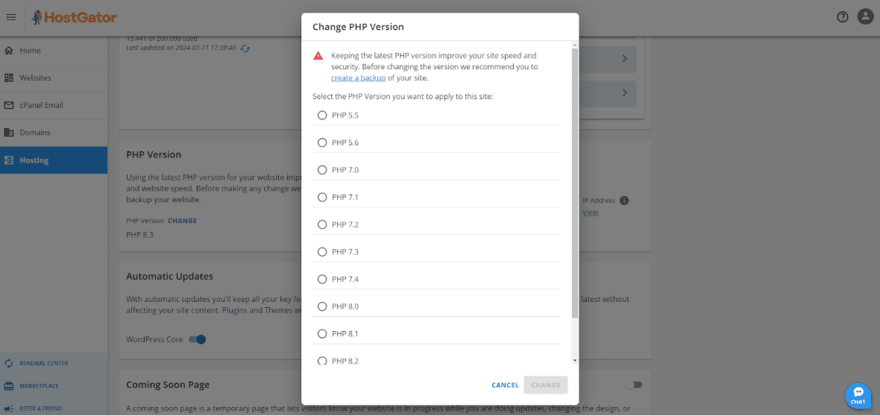
The control panel also makes adding other software easy by automating installations rather than requiring the need to manually compile source code like some Linux servers. And with full root administrator access permitted along with SSH connectivity, you can customize configurations to their specific needs if you’re a more advanced user.
Be cautious with your administration permissions, however – as Linux expert Jonathan Popoola explained:
Many run daily tasks with administrative privileges, putting the system at risk if breached. Instead, operate with minimal required permissions and only elevate when necessary.
The supported web frameworks range from Node.js to Ruby on Rails, while database options include MySQL and PostgreSQL, among others. Users have plenty of the coding and toolchain flexibility expected from Linux.
Performance Optimization
So, what kinds of Linux speed boosters does HostGator offer? It pairs well with Cloudflare to offload static files and slim down page weight for snappier loading. If you’re comfortable digging into config files, SSH access lets you tweak Apache, Nginx, and other parameters to your heart’s content.
Its VPS and dedicated plans also promise full root privileges if you want maximum control to hyper-optimize your Linux host environment. Then there’s the claimed 99.9% uptime guarantee, although we found it to be slightly less at 99.1%. This level of uptime isn’t ideal, especially when compared to the advertised speeds. A 99.9% uptime standard equates to about 8.76 hours of downtime per year. In comparison, 99.1% equates to around 79 hours of downtime per year, a significant difference.
Choosing HostGator for Your Linux Needs
For Linux hosting with more than enough bells and whistles, HostGator ticks many boxes even if its uptime isn’t quite what you might come to expect. However, unlimited bandwidth across plans and good support for addressing any potential issues makes HostGator a solid choice.
3. A2 Hosting
Best for speed

With A2 Hosting, you get a strong Linux hosting option thanks to features like free site migration, raw server access for customization, and turbo servers with faster page loads than standard hosting speeds.
Pros and Cons
✔️ What We Liked
- Top site speed and performance
- Great storage and bandwidth options for a smooth website operation
❌ What We Didn’t Like
- A2 Hosting also has high renewal prices that can exceed 70%
Who Should Use A2 Hosting
| Recommended for... | Not recommended for... |
|---|---|
| Users after fast speeds | Anyone who wants a free domain with hosting |
| Anyone after excellent storage and bandwidth options | |
WordPress Star rating: 4.1/5
More Information
- Check out our full A2 Hosting review.
Ease of Use
A2 Hosting offers a user-friendly cPanel for smart website and account management, suitable for all expertise levels. cPanel facilitates the handling of domains, emails, databases, and more through its easy-to-use interface.
Its managed WordPress hosting package offers instant WordPress deployment with pre-configurations for performance, security, and scalability options as your site grows.
Price and Plans
| Hosting type | Promotional price range (12 month term) | Renewal price range |
|---|---|---|
| Shared | $2.99–$14.99/month | $12.99–$29.99/month |
| Managed WordPress | $2.99–$18.99/month | $12.99–$35.99/month |
| VPS | $2.99–$79.99/month | $69.99–$189.99/month |
| Dedicated | $79.99–$379.99/month | $199.99–$649.99/month |
Even the most basic A2 Hosting plan has Linux support, which is great if you don’t want to break the bank. Even better, the Startup plan ($2.99 per month) gives you 100GB of storage, which is particularly impressive when lined up against the likes of HostGator and Bluehost. Move a couple of plans up, and you’ll get access to Turbo Boost, which offers 20 times faster page loads than standard hosting speeds.
Like HostGator, however, renewal prices are on the high side and easily increase by more than 70% in some cases. All entry prices for plans require a 12-month contract, although there is a 30-day money-back guarantee.
Linux Compatibility
With A2 Hosting, you get a Linux-compatible hosting environment that fully supports a variety of Linux-based applications and technologies. It offers a selection of popular Linux distributions, including Ubuntu, CentOS, and Debian, which you can choose from during the setup process.
Support for programming languages such as PHP, Python, and Perl means A2 Hosting guarantees that developers can easily deploy and manage Linux-specific software packages and dependencies.
Moreover, A2 Hosting grants root access and SSH for advanced customization so you can install and configure software to meet their specific needs.

Performance Optimization
Performance optimizations are tailored to A2 Hosting users, including server-side caching mechanisms like Turbo Cache and A2-optimized software for accelerating WordPress and other web apps.
You can configure server settings for Apache and Nginx to enhance performance, and tools like Memcached and OPcache are available for further optimization. These features are designed to improve the speed and efficiency of Linux-based websites and applications.
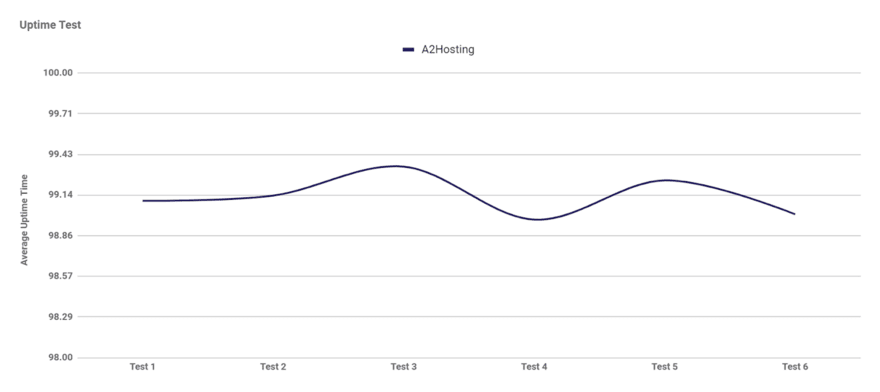
The Need for Linux Speed With A2 Hosting
Leave lag behind with A2 Hosting’s souped-up servers that offer free site migration, full customization access, and exclusive speed-focused optimizations pushing 20X faster page loads.
4. SiteGround
Best for security

With cutting-edge infrastructure like container-based architecture for security and custom resource allocation, SiteGround is a strong option when it comes to Linux hosting. And while it might not be top draw due to slower-than-usual load times, it’s still a solid option worth exploring.
Pros and Cons
✔️ What We Liked
- Top security features
- Responsive, helpful support
❌ What We Didn’t Like
- Extensive features might not be to everyone’s taste, especially if your website doesn’t require a lot of heavy lifting
Who Should Use SiteGround?
| Recommended for… | Not recommended for… |
|---|---|
| Businesses that want watertight security features | People who want to choose their Linux distribution during setup. |
| Websites handling sensitive data | |
WordPress star rating 3.7/5
More Information
- Take a look at our full SiteGround review.
Ease of Use
SiteGround delivers top user-friendliness courtesy of its highly customizable SiteTools, which acts as its version of the cPanel. It includes one-click installers for platforms like WordPress, Magento, and Joomla, plus preconfigured environments for faster deployment.
Between SiteGround’s in-depth knowledge base, video tutorials, and top-rated support channels like 24/7 chat and phone, you’ll have all the support you need, even if problems do arise.
The provider helps further in optimizing the customer journey for all technical levels through additional hand-holding resources, such as guided onboarding checklists for getting started.

Price and Plans
| Hosting type | Promotional Price Range (12 month term) | Renewal Price Range |
|---|---|---|
| Shared | $2.99–$7.99/month | $17.99–$44.99/month |
| Managed WordPress | $2.99–$7.99/month | $11.99–$44.99/month |
| Cloud | $100–$400 | $100–$400 |
By now, you’re likely aware that all the hosting options on our list offer Linux support across all of their plans. Currently, the basic-level plan—StartUp shared hosting—is $2.99 per month when signing up for a 12-month plan. Some of the benefits include unmetered traffic, 10GB of storage, free CDN, and advanced security.
Price jumps are steep once your initial period ends, with the same entry-level plan jumping from $2.99 per month to a whopping $17.99 per month. There is a 30-day money-back guarantee, however, so you can try before fully committing.
Linux Compatibility
SiteGround’s hosting environment is fully compatible with Linux-based applications and technologies, thanks to support for widely-used programming languages like PHP, Python, and Perl.
While SiteGround uses Fedora for its shared and cloud servers, it makes sure that all servers are up-to-date with the latest security patches.
Security Tip From Linux Expert:
My top advice for new users is to prioritize system updates, use strong passwords, enable your firewall, and be cautious running unknown programs.
— Jonathan Popoola
You can effortlessly install and manage software packages and dependencies specific to Linux. And while root access isn’t provided, SSH access is allowed across all hosting plans for even more secure management.
Infrastructure-wise, SiteGround supports popular frameworks and tools for an in-depth and flexible hosting solution. However, the fact that you can’t choose your preferred Linux distribution during setup, as SiteGround standardizes on Fedora for consistency and performance, might be off-putting for some.

Performance Optimization
You’ll also benefit from environment-specific tweaks and you can use the SG Optimizer plugin to configure caching and performance settings. While direct server parameter configuration is limited, SiteGround’s optimizations make certain of efficient resource usage and a decent, if not the fastest, website performance.
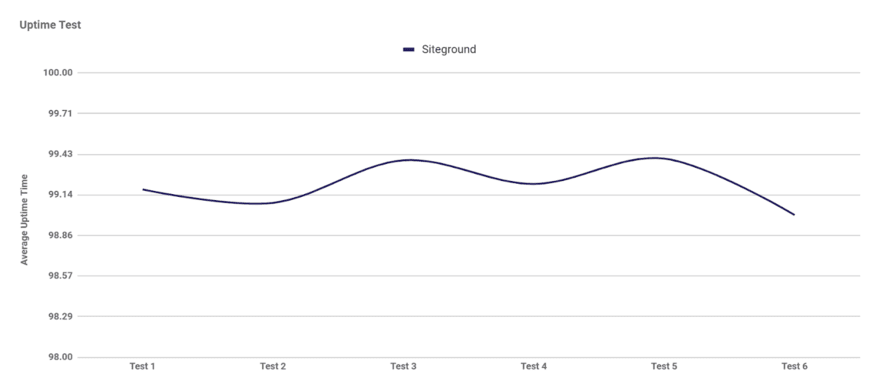
SiteGround for Linux Hosting
With optimized infrastructure, air-tight security protection, and handy ease-of-use offerings, SiteGround is a solid option for websites that need Linux reliability without compromising on support or top-class features, even on starter plans.
5. Hostinger
Best for pricing

Hostinger hits the right notes with its Linux hosting thanks to quality SSD-based servers, cloud infrastructure, and a customizable control panel. But perhaps most importantly, its pricing structure is one of the best around. While $2.99 per month isn’t the cheapest option on the market, three free months for users who sign up gives Hostinger the edge in the pricing stakes.
Pros and Cons
✔️ What We Liked
- Three months free when you sign up
- Custom-built hPanel for ease of use
❌ What We Didn’t Like
- Limited bandwidth and processing on the cheapest plans
Who Should Use Hostinger
| Recommended for… | Not recommended for… |
|---|---|
| Beginner and small-to-medium size business | High-traffic websites |
| Budget-conscious users | |
More Information
- Read our full Hostinger review to get all the details.
WordPress star rating: 3.6/5
Ease of Use
Hostinger is known for its user-friendly hPanel, a custom control panel designed for ease of use and streamlined management. It includes one-click installers for popular applications such as WordPress and Joomla and helps simplify the setup process. You can manage domains, emails, databases, and more in the hPanel, which is accessible for all skill levels.
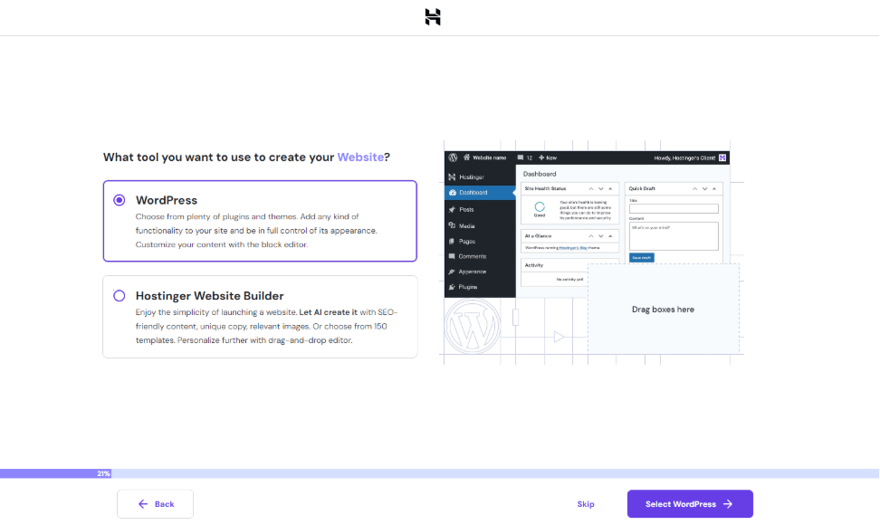
Pricing and Plans
| Hosting type | Promotional Price Range (48 month term) | Renewal Price Range |
|---|---|---|
| Shared | $2.99–$9.99/month | $7.99–$19.99/month |
| VPS | $4.49–$19.99/month | $13.99–$59.99/month |
| Cloud | $9.99–$29.99/month | $19.99–$54.99/month |
The cheapest plan—Premium—is $2.99 per month when you sign up, but you get the first three months for free. Not only that, but you’ll pay less for longer, as most web hosting plans are offered between 12 and 36 months. Hostinger, however, wants you to commit for 48 months, with value placed on users willing to commit for longer.
While that sounds like a long time, on average, it means you’re locked into the lower rate for longer. Plus, there’s a 30-day money-back guarantee if you find it’s not quite right for you.
As for the plans, the cheapest option is somewhat limited, with no free CDN or dedicated IP address. On the plus side, you get a generous 100GB of storage, especially compared with the likes of HostGator, which has a mich lower allowance of 10GB. .
More Information:
- Take a look at our full Hostinger pricing review.
Linux Compatibility
Hostinger’s plans offer extensive Linux compatibility, such as several Linux-based operating system templates, including CentOS, Ubuntu, Debian, AlmaLinux, and Rocky Linux. If you’re upgrading to the VPS plan, Hostinger will even install it automatically for you. Hostinger supports common programming languages and frameworks like PHP, Node.js, and Python, so developers can work with the tools needed.
Performance Optimization
Hostinger enhances its hosting services with performance optimizations tailored for Linux servers, including the implementation of LiteSpeed Web Servers for advanced caching capabilities. These optimizations, alongside tools like the LiteSpeed Cache plugin, significantly boost website speed and efficiency.
Hostinger provides a suite of server-side caching and performance optimization tools accessible to its users, guaranteeing optimized performance across all hosting solutions.
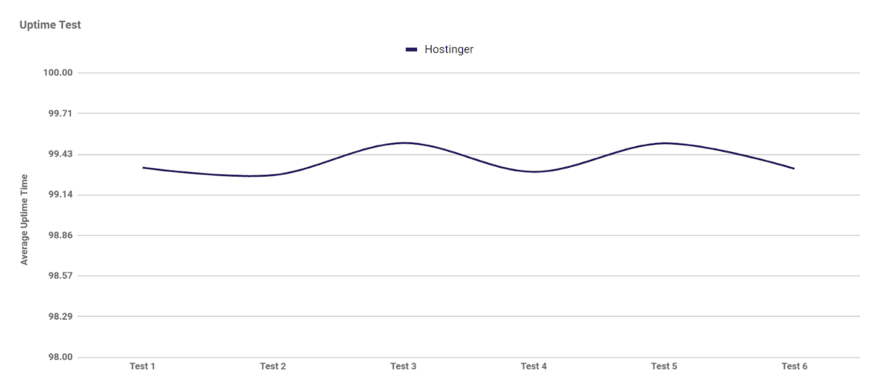
Budget Linux Hosting With Hostinger
Boasting three months free on sign-up, Hostinger wins big points for Linux hosting affordability while still serving up ample SSD storage, one-click CMS installs, and its slick hPanel for ease of use.
Questions and Answers With a Linux Expert
We spoke to Jonathan Popoola, a UX and front end consultant with more than two decades of experience. In that time, he’s worked with big companies, including Sky, Thomson Reuters, and the UK government. During his years in UX, the need to use Linux has popped up more than a few times, and he’s become quite the expert on the topic. Here’s what Jonathan thinks about the operating system.
Q: What tips do you have for new Linux users when it comes to things like security and backups?
Jonathan: “My top advice for new users is to prioritize system updates, use strong passwords, enable your firewall, and be cautious running unknown programs. Backup religiously, ideally daily, with both local and cloud copies. Verify your backups regularly. Stay vigilant and prepared, and don’t hesitate to ask the community if you have any other questions.”
Q: What’s one optimization you would recommend for improving performance?
Jonathan: “If I had to recommend one optimization to improve Linux performance, it would be to properly configure your storage and filesystem. Use a modern filesystem like ext4 or XFS, and consider leveraging Logical Volume Management (LVM) for flexibility. Make sure your storage devices are operating optimally, and if using a spinning disk, configure the I/O scheduler for your workload. Proper storage configuration can significantly boost system responsiveness and performance.”
Q: What is one key aspect Linux users overlook when it comes to security?
Jonathan: “A key security aspect that I think is often overlooked by Linux users is the principle of least privilege. Many run daily tasks with administrative privileges, putting the system at risk if breached. Instead, operate with minimal required permissions and only elevate when necessary. Proper user and permission management is crucial for a secure environment. Avoid running as root!”
Q: How can some of the newest tech trends help my Linux website?
Jonathan: “Containerization tools like Docker improve portability, scalability, and consistency across environments. Then there’s serverless computing, which reduces costs and simplifies deployment by abstracting infrastructure management. Implementing Progressive Web Apps (PWAs) can boost user engagement with app-like experiences, and adopting HTTP/3 (QUIC) accelerates content delivery and reduces latency. ”
Q: What got you into Linux, and what do you like about it?
Jonathan: “As a UX and front-end specialist, my journey with Linux began somewhat unexpectedly. Over the years, various projects have required me to dive into the world of Linux, whether it was setting up servers, optimizing website performance, or ensuring compatibility across platforms.
Through these experiences, I’ve developed a deep appreciation for Linux’s robustness, security, and flexibility. Working with Linux has expanded my skill set and allowed me to deliver more comprehensive solutions to clients.”
Buying Guide: How To Choose a Linux Hosting Provider
With Linux being a highly versatile operating system for hosting websites and web applications, it’s important to consider what specific capabilities you need from a host. When evaluating providers, keep these key factors in mind:
Support for Your Preferred Linux Distribution
You’ll want to verify which popular Linux distributions like Ubuntu, CentOS, Debian or Fedora are officially supported. Having options to select your preferred distribution or OS version is ideal so you can match what you are using for development and testing environments. Standardizing on the same stack from dev through production avoids compatibility issues.
Programming Languages and Framework Support
Assess what languages, libraries, and web frameworks are compatible out-of-the-box. For example, confirm they support PHP 8+ or other PHP versions still needed for legacy apps, as well as availability of Python, Node.js, Ruby, .NET and more based on your requirements. Up-to-date MySQL, PostgreSQL database and SSL/TLS protocol support should be included as well so everything integrates for your web apps and sites.
Included Performance Enhancements and Optimizations
Examine what caching mechanisms, CDNs, database connection handling, and optimizations they have tailored specifically for accelerating Linux-hosted websites and dynamic apps. Configuring Redis or Varnish for page caching is very common, for example. Also, see if they allow web server tuning by editing Nginx, Apache or other config parameters that impact resource usage and response times.
Server Access and Customization Capabilities
Consider what degree of shell access, SSH connectivity, root privileges, and server config edits are allowed, especially if you need to fine tune the operating system and stack settings beyond defaults. Some providers limit access in shared environments while high-end plans cater to Linux pros. DevOps teams may prioritize automation friendliness as well.
Administration Ease-of-Use
Assess the Linux web hosting provider’s control panel interfaces, guided setup workflows, one-click app install options, and customer support responsiveness. If you find they’re lacking server admin experience, lean towards hosts that simplify management versus assuming deep technical expertise upfront. Documentation quality also influences the learning curve.
How We Test Hosting Providers
We invest extensive time analyzing major hosting providers to provide impartial recommendations. That process examines over 360 data points across five key performance categories: pricing, infrastructure performance, features, support, and market competitiveness.
Pricing analysis calculates the total cost over a 12-month period to enable equal comparisons, also factoring in renewal fees and money-back guarantees. Performance testing leverages over 1,700 test sites to evaluate metrics like uptime, page load speeds, and server response times.
We audit essential features like backup frequency, security protections, server locations, and control panel usability. Finally, we use market data to compare plans offered, popularity, and customer sentiment.
Assigning weighted scores reflecting what matters most to different hosting needs means our methodology matches users to the provider best fitting their website priorities.
Summary: 5 Best Linux Web Hosting Providers
After comparing the top contenders on the all-important factors like performance, support, ease-of-use, and affordability, Bluehost emerges as the best all-around Linux web hosting provider. With its optimized servers, open source breadth, out-of-box speed, and value proposition, it takes our highest recommendation for launching Linux-based sites and applications.
2 comments